Do you know a local high school student who likes to work hard in the outdoors, doesn’t mind getting their hands dirty, and is looking for work this summer? The Kenai National Wildlife Refuge has a challenging yet rewarding seasonal job opportunity for young adults between the ages of 15 and 18 for this upcoming summer.
The available positions are part of the refuge’s Youth Conservation Corps, a hands-on summer employment program and learning experience that promotes the values of personal responsibility, hard work, skill development and respect for the environment.
The YCC is a direct descendant of President Franklin Delano Roosevelt’s Civilian Conservation Corps program of the 1930s, which sought to provide alternative employment for a large segment of the population whose lives were derailed by the Great Depression.
In total, over 6 million young men served in the CCC from 1933 to 1942, drastically improving our public lands, including planting an estimated 3 billion trees to renew the nation’s decimated forests.
While the CCC program officially ended in 1942, the conservation corps movement and concept lived on in the nation’s hearts and minds. It was revived in 1957, when the Student Conservation Association and its founder, Liz Putman, first placed college students as volunteers in national parks and forests.
Just over a decade later, the late Sen. Henry M. “Scoop” Jackson used the SCA model as the basis for legislation that created the YCC.
At its height during the mid-1970s, the YCC enrolled some 32,000 young people. Each summer, they worked in both cities and wilderness across the country, performing a variety of conservation projects. Unfortunately, by the 1980s, federal budget cuts all but eliminated the program.
However, the YCC had proved its value, and many states continued to fund conservation corps programs directly with little to no federal assistance.
Today, the YCC is perhaps the most well-recognized youth program in the U.S. Fish & Wildlife Service. It has been instrumental in introducing young Americans to resource management and conservation opportunities on national wildlife refuges.
Locally, the first YCC program opened at the Kenai refuge, formerly named the Kenai National Moose Range, on June 17, 1974, with 30 youth and six adult leaders. Although crew size and program funding have risen and fallen over the years, the program remains true to the founding principles and original intent.
The refuge continues to believe engaging young people in environmental service projects is an effective and innovative way to provide youth with skills that enhance their employability, protect or restore critical ecosystems, and create a pro-conservation citizenry.
Since its inception, the YCC has accomplished high-priority and meaningful conservation projects on the refuge, such as trail maintenance, boardwalk repair, bridge construction, historic cabin restoration, invasive species eradication, habitat protection, wildlife research and facility maintenance.
It would be hard to find a campground, trail, sign or structure on the refuge that hasn’t been maintained, improved or enhanced by the work of YCC crews over the years.
The work is physically demanding, and the working conditions are not always ideal, but the crew typically enjoys some of the most beautiful scenery the Kenai refuge offers. Perhaps the most challenging yet exciting aspect of the job is the opportunities for the YCC to participate in extended overnight stays in the field.
These primitive “spike camps” are necessary to complete projects in remote areas of the refuge where daily communing is not feasible. What the “spike camps” lack in creature comforts is offset by the unique and memorable wilderness and backcountry experience they offer.
This summer employment program permits a few lucky high school students to enjoy working, earning, and learning together by completing projects that help protect, preserve and restore the natural, cultural and historic resources of the Kenai refuge.
Through the performance of important conservation work, our local youth expand their job and leadership skills, develop personal values, ethics and an awareness of social, political and environmental issues. In addition, by participating in this meaningful experience, they not only make a lasting impression on the environment but on our community and those around them.
Applications are available at all local high schools, the Alaska Employment Service in Kenai and the Kenai Refuge Headquarters on Ski Hill Road in Soldotna. We will accept applications until April 22. Participants will receive training in first aid, CPR, hand tool use and bear safety. The pay rate will be $13.50 per hour, and the employment period is June 6 to July 29.
Scott Slavik is a Visitor Services Specialist at Kenai National Wildlife Refuge in Soldotna, Alaska. Follow us on Facebook for additional information from the Refuge http://www.facebook.com/kenainationalwildliferefuge.


